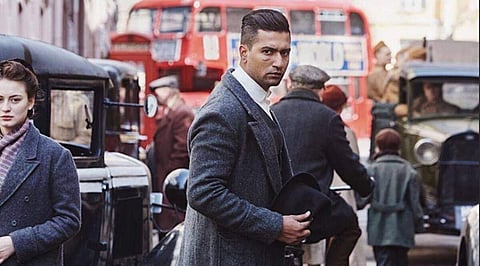

Back in school, we had a healthy culture of teachers substituting for each other. This was oddly frequent in the literature and history classes, where the chapters ran long. A new teacher would walk in, ask us where we left off, and take it from there. The experience was usually awkward, with many of my classmates preferring to doze off. Yet, I remember that distinct sensation—a chance to hear a slightly different perspective on something set in stone.
Cast: Vicky Kaushal, Amol Parashar, Banita Sandhu, Shaun Scott, Kirsty Averton
Director: Shoojit Sircar
Streaming on: Amazon Prime Video
Watching Sardar Udham—a film on the Indian revolutionary who shot Michael O'Dwyer in London in 1940, expressly to avenge the 1919 Jallianwala Bagh massacre in Amritsar (O’Dwyer was Punjab’s Lieutenant Governor at the time)—feels like sitting in that substitute class. Director Shoojit Sircar and screenwriters Shubhendu Bhattacharya and Ritesh Shah stick to facts and keep the broader patriotic plates spinning. But they also toss out chronology and smuggle thrilling contemporary commentary between the lines. Would audiences today tear up watching Bhagat Singh being led up to the noose? Sure they will. But what about a flashback where he details the tenets of a ‘true revolutionary’, saying they cannot be “biased, communal, casteist”? Hmm…
ALSO READ|| Sardar Udham: Vicky Kaushal introduces Amol Parashar as Shaheed Bhagat Singh
In early 1931, Bhagat Singh’s organization is crushed and Udham is in jail. He gets out and makes for London (lead actor Vicky Kaushal’s brother, Sunny, was doing the same for entirely wrongheaded reasons in Shiddat). Teaming up with scattered expatriates, he states an exterior plan of regrouping lost rebels. Soon, though, we see him circling off names with ‘O’Dwyer’, with bloody murder brewing in his eyes. Before we know it, he’s at Caxton Hall, putting six rounds into frail old O’Dwyer and two other former servants of the Raj.
The cut from 1934, when Udham reached London, to 1940, when he got his revenge, is near-imperceptible and designed to trick. I was shocked to find the killing over in a flash, with over two hours of story still to come. The intention, I believe, was to relieve the tension of a thriller, thus allowing other dimensions of his life—his many travels seeking help and munitions, the Punjab flashbacks—to get their due diligence. This sounds promising, except Shoojit strains to make good use of all the time he’s bought. The truly colourful details—Udham worked as everything from a lingerie salesman to a movie set extra in London—are hastened over, while his two love affairs are clipped and businesslike. It’s like the makers wanted to tap into these aspects of a freedom fighter’s life, but feared treading beyond a point.
In a fairly indulgent sequence, Udham charms an unsuspecting O’Dwyer and lands employment in his house. Irrespective of the historical accuracy of this passage, it struck me as a sign of the film’s dramatic urges—and how sooner or later every biopic succumbs to one. “That’s a trait I have always admired in Indians,” O’Dwyer tells Udham, “the willingness to please”—a line as needling as anything out of Lagaan or The Legend of Bhagat Singh. “He had absolutely no remorse,” Udham states later, confirming his victim’s villainy to the prosecutors and to us.
As a Bollywood production shot in London, Sardar Udham comes home with dignity. There are no tacky set extensions or exaggerated costumes. Cinematographer Avik Mukhopadhyay shoots grand street scenes with a frank urgency. The Jallianwala Bagh massacre, which comes at the 110-minute mark and lasts till the end, is the film’s visual and emotional centerpiece. It drags on as a grim, bloodied nightmare, a bold close that elevates Udham as a humanist hero over a revolutionary one.
Vicky Kaushal is at the right age to play characters over extended timelines. He tackles the hard stuff confidently; you can feel his horror and angst as Udham narrates the 1919 massacre, over visuals that show him as a young boy. Nevertheless, the sheer responsibility of the role seems to burden the actor. He shines in the unexpected bits, picking up a ladoo delightedly or confessing surprise with: “Tussi jante ho?”
In court, Udham announces his name as Ram Mohammad Singh Azad—representative, we’re told, of the religious unity of India. He also swears on a book of Heer Ranjha, not exactly the ‘seditious’ material the judge fears it is. These are minor rebellions in the face of a big one, and they jostle and sparkle in Shoojit Sircar’s film. Roughly but resonantly, they speak to the here and now.